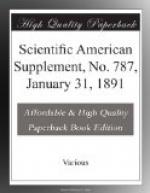The new premium for the 10-year endowment policy, $89.71, commends itself at once to the applicant, who can easily see that his total outlay must fall short of the amount ultimately to be realized, of course, disregarding interest and probable dividends in both cases.
In discounting the future expense contributions I have not taken the chances of dying into account. Hence the expense reserve in any instance applies only to that individual case, and, in the event of death or surrender before the maturity of the policy, the amount of the expense fund not used would naturally revert to the insured.
The scheme of expense assessment outlined above will doubtless be pronounced impracticable by the majority of insurance men.
Such a far reaching reform is too much to hope for, at least in the immediate future.
No well informed life insurance expert will deny that there are opportunities for improvement in the business, but to graft new methods on old companies is a hopeless undertaking.
It is well, however, to have new methods well matured in advance of the public demand, and I feel convinced that the ideas here set forth are in the line of the reform which, before long, must be instituted by the companies if they would retain the confidence and patronage of the community.
Doubtless many insurance presidents could tell of suggestions which have impressed them favorably and which they would gladly have adopted were it not for the injustice done thereby to older members and the changes necessary to bring existing contracts into conformity with the new system. Similar objections may be urged against the ideas here advanced, and I must confess I hardly see a way by which the present suggestions can be utilized by existing companies. We can only hope that sooner or later some of the new theories may be practically tested. Meanwhile the companies at present in the field are doing a great work for the good of humanity, even though their methods may be, in some particulars, more practical than scientific.
Winchester, Mass. FRANK J. WILLS.
* * * * *
THE FLOOD AT KARLSBAD.
During the flood which occurred in Germany and Bohemia, the last week of November, Karlsbad was especially unfortunate; it suffered such an inundation as had never before been known in the “Sprudelstadt.” On the evening of November 23, the Tepl was very much swollen by the rain, which had continued for several days, but it was supposed that there was no danger of a flood, as the bed of the river had been put in proper condition. During the forenoon of November 24, the water suddenly began to rise with such astonishing rapidity that within half an hour all the lower streets were like turbulent rivers and the Alte and Neue Wiese were transformed into a lake. The stores on the Alte Wiese were under water to the roofs, and the




